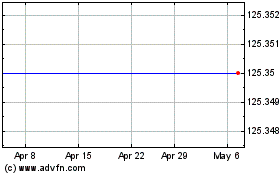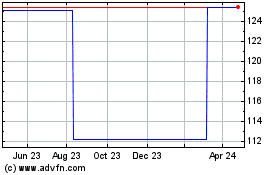By Rhiannon Hoyle
SYDNEY -- Rio Tinto PLC should compensate an Australian
indigenous group over the destruction of two ancient rock shelters,
an inquiry has found, while calling for an end to the secrecy over
how miners secure land access.
Australian lawmakers have been investigating the destruction of
the caves at Juukan Gorge in the north west of the country on May
24, which cost Rio Tinto's chief executive his job and damaged the
mining industry's reputation more broadly.
On Wednesday, lawmakers recommended Rio Tinto negotiate a
restitution package with the traditional owners of the site, the
Puutu Kunti Kurrama and Pinikura people, or PKKP. They also urged
Rio Tinto and its western Australian peers to end the use of gag
clauses in land-use agreements that have stopped Aboriginal groups
from speaking out against mining operations.
The inquiry has the potential to reboot the relationship between
indigenous communities and miners, which rank among Australia's
biggest companies.
Globally, many mining operations are on land traditionally owned
by indigenous groups, including in South America, Africa and the
Arctic Circle. While environmental, social and governance standards
have become increasingly important for investors in recent years,
much of the focus has been on tackling emissions or curbing
environmental disasters after waste-dam collapses.
The Australian inquiry highlighted the power imbalance between
the mining industry and indigenous groups. It found most agreements
contained clauses that prevented traditional landowners from taking
legal action or raising concerns to prevent the destruction of
heritage sites.
"We hope the inquiry's preliminary findings prompt a fundamental
reset of the sector, particularly in the relationships between
traditional owners and mining companies, and pave a way forward for
more equal partnerships," said PKKP Aboriginal Corporation
spokesman Burchell Hayes.
While Rio Tinto and its largest peer, BHP Group Ltd., have
signaled an intention to no longer rely on gag clauses, uncertainty
remains over exactly how companies will unwind such measures, the
report said.
The inquiry also found serious failings of laws designed to
protect indigenous heritage.
"The PKKP faced a perfect storm, with no support or protection
from anywhere," said Warren Entsch, chairman of the committee
handling the inquiry.
Rio Tinto, the world's second-largest miner by market value,
said in September that Chief Executive Jean-Sébastien Jacques would
leave after more than four years in the role, bowing to pressure
from investors for its senior leaders to be held accountable. Two
other executives, including Chris Salisbury, the head of its
iron-ore division, also stood down.
The rock shelters in Australia's minerals-rich Pilbara region,
which supplies more than half the world's iron ore traded by sea,
contained a trove of artifacts that indicated they had been
occupied by humans more than 46,000 years ago.
"There are less than a handful of known Aboriginal sites in
Australia that are as old as this one," Puutu Kunti Kurrama Land
Committee chairman John Ashburton said earlier this year.
Rio Tinto, which didn't break any laws when destroying the site,
has apologized and acknowledged that its actions damaged trust
between the company and the indigenous landowners.
"We are committed to learning from this event to ensure the
destruction of heritage sites of such exceptional archaeological
and cultural significance never occurs again," Rio Tinto Chairman
Simon Thompson said.
The inquiry has raised questions over how to calculate fair
compensation. Meredith Edelman, a law lecturer at Australia's
Monash University, suggested Rio Tinto could offer the PKKP an
equity stake in the company, and in doing so, give the group
influence to direct it on important cultural issues.
Rio Tinto had previously cut bonuses for Mr. Jacques, Mr.
Salisbury and Simone Niven, head of corporate relations, but
stakeholders demanded further action.
"Losing their bonuses were insufficient and irrelevant in the
context of the destruction of irreplaceable heritage sites, the
value of which is impossible to calculate," Tal Lomnitzer, senior
natural resources portfolio manager at Janus Henderson Investors,
said in September.
Poor communication between Mr. Jacques and his team was part of
a catalog of failings presented to the inquiry. Mr. Jacques told
the inquiry he didn't become aware of the site's cultural
significance until the evening of May 24, the day that the caves
were blown up.
Preservation issues create frustrations for miners and
landowners alike. Addressing heritage concerns can be complex for
mining companies that plan massive projects over vast areas dotted
with sites of varying cultural significance. Indigenous groups,
meanwhile, complain that inflexible regulations don't allow for new
archaeological information to be considered once heritage consents
have been granted.
"We have developed our mining plans to protect and avoid these
places," but sometimes "there are no easy answers," said Elizabeth
Gaines, the chief executive of Australian iron-ore company
Fortescue Metals Group Ltd.
The committee said it has decided to continue its inquiry,
citing the large volume of evidence it continued to receive and
constraints imposed by the coronavirus pandemic.
Among other recommendations made Wednesday, the committee said
Rio Tinto should rebuild the rock shelters at Juukan Gorge and
commit to a permanent moratorium on mining in the area that would
also protect it from other miners.
Rio Tinto said it was already working with the landowners on a
rehabilitation program and was assessing ways to protect the
area.
Write to Rhiannon Hoyle at rhiannon.hoyle@wsj.com
(END) Dow Jones Newswires
December 09, 2020 06:38 ET (11:38 GMT)
Copyright (c) 2020 Dow Jones & Company, Inc.
Rio Tinto (ASX:RIOCD)
Historical Stock Chart
From Mar 2024 to Apr 2024

Rio Tinto (ASX:RIOCD)
Historical Stock Chart
From Apr 2023 to Apr 2024
